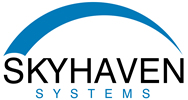Skyhaven Systems Receives Multi-year Award From NASA To Develop A Lunar Regolith Separation System
BOSTON, October 6, 2009 — Skyhaven Systems, LLC received a multi-year contract from the NASA Glenn Research Center to develop a reactive-separator process unit to remove hydrogen sulfide and sulfur dioxide from regolith process streams for NASA’s lunar habitation outpost. The processing of lunar regolith to produce oxygen has been studied previously by NASA culminating with a number of process flow systems. One of the issues that has been identified by NASA is the need to separate hydrogen sulfide and sulfur dioxide from regolith process streams in low-pressure drop systems. Separating the sulfur compounds from the regolith is needed to prevent downstream corrosion and contamination of process units. Another reason for separating the sulfur compounds from the regolith is to capture the hydrogen sulfide and use it to reduce iron, calcium, and magnesium oxide in the lunar regolith using a high temperature thermal decomposition process.
Commercial applications of this reactive-separation unit beyond NASA needs may find applications in processing and removing sulfur-based compounds from exhaust streams including automotive gasoline and diesel engine exhausts, coal-fired utility operations and burners, and petro-chemical refinery operations. The low-pressure drop design of the reactive-separator unit in a compact and lightweight design would lessen the impact of removing sulfur on the engine and combustion efficiency. One potential application of the proposed sulfur removal system is for the deep desulfurization of diesel fuel, a technically challenging pursuit driven by legislative mandates in most countries to gradually reduce the sulfur content. Heightened interest in ultra-clean fuels is also driven by the need for new emissions control technologies for IC engines, especially those for diesel fuels, and the use of on-board or on-site reforming of hydrocarbon fuels for new fuel cell vehicles. Given the importance of this topic, there are numerous research programs being conducted throughout the world to improve desulfurization technologies that can function with diesel fuel, JP-5, and JP-8 jet fuels for military and commercial applications.






